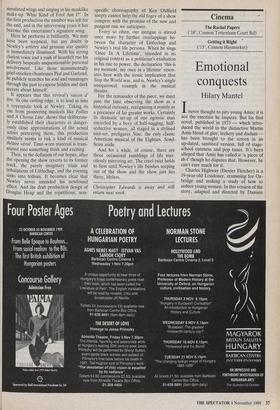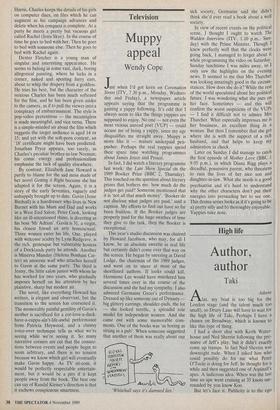Cinema
The Rachel Papers ('18', Cannon Tottenham Court Rd) Getting it Right ('15', Cannon Haymarket)
Emotional conquests
Hilary Mantel
Inever thought to pity young Amis; it is not the emotion he inspires. But his first novel, published in 1973 — which intro- duced the world to the distinctive Martin Amis blend of glee, lechery and disdain --- has been brought to the screen in an up-dated, sanitised version, full of stage- school cuteness and pop tunes. It's been alleged that Amis has called it 'a piece of sh-t' though he disputes that. However, he can't care much for it.
Charles Highway (Dexter Fletcher) is a 19-year-old Londoner, cramming for Ox- bridge and making a study of how to seduce young women. In this version of the story, adapted and directed by Damien Harris, Charles keeps the details of his girls on computer discs, on files which he can augment as his campaign advances and delete when his conquest is complete. At a party he meets a pretty but vacuous girl called Rachel (Iona Skye). In the course of time he goes to bed with her. Then he goes • to bed with someone else. Then he goes to bed with Rachel again.
Dexter Fletcher is a young man of singular and interesting appearance. He seems to belong in some vast, dark, boring allegorical painting, where he lurks in a corner, naked and sporting furry ears, about to whip the drapery from a goddess. He tries his best, but the character of the noxious Charles has been much softened for the film, and he has been given asides to the camera, as if to pull the viewer into a conspiracy of embarrassment. The style is pop-video pretentious — the meaningless is made meaningful, and vice versa. There is a simple-minded air about the film which suggests the target audience is aged 14 or 15; and yet with the soft-porn content, an `18' certificate might have been predicted. Jonathan Pryce appears, too rarely, as Charles's peculiar brother-in-law Norman; his comic energy and professionalism emphasise the lack of quality elsewhere.
By contrast, Elizabeth Jane Howard is partly to blame for the sad mess made of her novel Getting it Right because she has adapted it for the screen. Again, it is a story of the early Seventies, vaguely and unhappily brought up to date. Gavin (Jesse Birdsall) is a hairdresser who lives in New Barnet with his Mum and Dad and works in a West End Salon; Peter Cook, looking like an ill-intentioned rhino, is diverting as his boss `Mr Adrian'. Gavin is 31, a virgin, his closest friend an arty homosexual. Three women enter his life. One, played with welcome acidity by Lynn Redgrave, is the rich, grotesque but vulnerable hostess of a Docklands party he attends. Another is Minerva Munday (Helena Bonham Car- ter) an anorexic waif who attaches herself to Gavin at the same party. The third is Jenny, the little salon junior with whom he has worked for two years, who gradually imposes herself on his attention by her plaintive, sharp but modest air.
The novel, like everything Howard has written, is elegant and observant, but the transition to the screen has coarsened it. The memorably painful gentility of Gavin's mother is sacrificed for a cor-love-a-duck- have-a-cuppa-ain't-life-awful performance from Patricia Heywood, and a clumsy voice-over technique tells us what we're seeing while we're seeing it. So many narrative corners are cut that the connec- tions between events and people begin to seem arbitrary, and there is no tension because we know which girl will eventually make Gavin. happy. As TV sit-corn, it would be perfectly respectable entertain- ment, but it would be a pity if it kept people away from the book. The best one can say of Randal Kleiser's direction is that it eschews conspicuous smartness.

















































 Previous page
Previous page